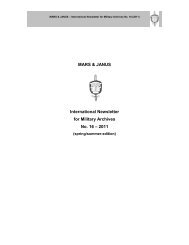National Experiences - British Commission for Military History
National Experiences - British Commission for Military History
National Experiences - British Commission for Military History
Create successful ePaper yourself
Turn your PDF publications into a flip-book with our unique Google optimized e-Paper software.
In t r o d u c t I o n • Av I At I o n A n d te c h n o l o g I c A l su p e r I o r I t y between new co n f l I c t s A n d dI p l o m A c y 27<br />
Algeria and Indochina, in the’50s and ’60s we had witnessed the «growing inability<br />
of Western peoples to allow <strong>for</strong> the dimension of physical fatigue, sacrifice and finally<br />
death, which on the contrary is typical of pre-industrial societies» 7 .<br />
In Vietnam, overfed and over equipped American soldiers, bombardments with<br />
napalm, sensors dropped in the <strong>for</strong>ests, didn’t manage to eliminate the Vietcong, who<br />
survived with an handful of rice, penetrated through the «Ho Chi Minh’s path» and,<br />
unlike the Americans, were convinced of the righteousness of their cause. Already<br />
at that time the dichotomy was evident between the Western-type technological war,<br />
which aimed to minimize the risks <strong>for</strong> its soldiers, and the “dirty” wars of the tribes,<br />
the ethic, political and religious groups of the “other world” (which may be located<br />
also in Europe, as in Bosnia and Kosovo!), where human life has little value and may<br />
be spent easily <strong>for</strong> one’s values and interests, anti-personnel mines, the Kalashnikov<br />
or even the machete still dominate the battlefield.<br />
The first Gulf War (1991), NATO interventions in Bosnia (1994), Kosovo (1999)<br />
and Libya (2011) reproposed the question, already debated after the Second World<br />
War 8 , if Aviation alone may win a conflict. Evaluating <strong>for</strong> example the Kosovo campaign,<br />
military historians (as John Keegan), scholars of strategy (as John Chipman)<br />
and General Michael Short himself, commander of the Alliance’s air <strong>for</strong>ces, discussed<br />
the lessons learned <strong>for</strong>m an operation per<strong>for</strong>med without employing land<br />
troops and without casualties <strong>for</strong> NATO <strong>for</strong>ces. Some stressed the support given in<br />
the field by UÇK guerrillas, who <strong>for</strong>ced the Serbs to come into the open and then<br />
be hit and by NATO, and by special <strong>for</strong>ces infiltrated in the territory and also that<br />
Serbia’s decision to surrender was heavily influenced by the increasing threat of a<br />
land invasion.<br />
The advantages, but also some possible risks of the exclusive employment of<br />
Airpower are indicated in the following remarks: «The most publicized advantage of<br />
air power in restricting adversary countermoves is the relative invulnerability of U.<br />
7 E. Galli della Loggia, Il mondo contemporaneo (1945-1980), Bologna, 1982, pp. 266-68. The Western<br />
soldiers, through modern weapons, try «not to contact bloodshed» (Qiao Liang-Wang Xiangsui,<br />
Guerra senza limiti. L’arte della guerra asimmetrica fra terrorismo e globalizzazione, Gorizia,<br />
2001, p. 75).<br />
8 Also the Italian magazine Rivista Aeronautica entered the debate on the importance of Airpower in<br />
the Second World War, publishing, among others, an article by General Carl Spaatz, Commander of<br />
the United States Army Air Force (as we know, the U. S. Air Force was created as an autonomous<br />
service only in 1947), who supported the thesis of Airpower as only instrument of global power<br />
projection and the «planned and ready air offensive» as the «only real defence» in the atomic age,<br />
while according to his compatriot Admiral Ernest J. King, Chief of Naval Operations during the<br />
war, maritime power still played a determinant role, since only the Navy had actually guaranteed<br />
the control of the bases to launch the atomic attack against Japan. Another subject debated was the<br />
evaluation of the impact, more or less important, of allied bombardments against Germany (see M.<br />
de Leonardis, The Debate in the <strong>Military</strong> Press and in the Public Opinion on the Lessons Learned<br />
and the Recorganization of the Italian Armed Forces after the Second World War, in Aa. Vv., War,<br />
<strong>Military</strong> and Media from Gutenberg to Today, Acta of the XXVIII th International Congress of <strong>Military</strong><br />
<strong>History</strong>, Bucarest, 2004, pp. 492-502).



